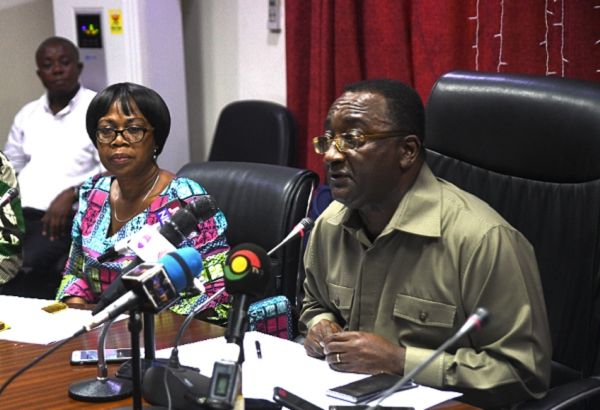
MoFA moves to check health of local vegetables
The Ministry of Food and Agriculture (MoFA) has announced reforms to improve the health (phytosanitary systems) of vegetables grown in the country to stop the high level of local interceptions of their exports at the exit points.
The sector Minister, Dr Owusu Afriyie Akoto, who announced this in Accra yesterday, said the measures included the upgrading of the manual traceability system to an electronic platform to minimise the sourcing of products from unapproved farms.
That, he said, was to ensure that the right quantities were approved for export.
He said the overall inspection along the value chain, from the farm to the pack house to the exit points, would be strengthened with two staff of the Plant Protection Regulatory Service Directorate (PPRSD) to be assigned to each of the 100 identified active vegetable exporters.
The officers are to ensure close inspection and provide technical support from the farms through to the pack house where items are packaged to the points of exit.
An electronic quality assurance vegetable production system for export will be implemented while pack houses will also be inspected, classified and licensed as standard pack houses.
Vegetables suspended
Briefing the media on the suspension of the vegetables, Dr Afriyie said the country took the proactive measures to prevent a total ban from the European Union as it happened in 2015.
The PPRSD of MoFA, in a statement on May 23, 2019 announced that some selected vegetables had been suspended indefinitely from the list of exportable commodities from Ghana to the international market.
The statement said effective June 1, this year, the export of capsicum (a group of chilli peppers), soladum, luffa (a group of cucumbers) and all leafy vegetables to the European Union (EU) will be suspended due to the detection of some harmful organisms in those vegetables.
EU bans Ghana in 2015
According to Dr Akoto, the current suspension of vegetable exports was an internal decision that reflected a zero tolerance for mediocrity and poor quality assurance systems.
He recalled the EU initial ban in 2015 on vegetables from the country to the EU which was occasioned by detection of harmful organisms on Ghana’s vegetable exports resulting in several notifications from the EU.
The condition of lifting the ban was contingent on the country’s ability to meet the phytosanitary requirements of the EU and so in 2017 the Ministry set up a taskforce to ensure that the ban was lifted which achieved its goal in January, 2018.
As a result of the ban, Ghana lost about US$36 million in foreign exchange on some vegetable exports into the EU market between 2015 and 2017.
Following the measures put in place after the lifting of the ban to reduce a recurrence, Dr Akoto said the phytosanitary conditions improved as the number of notifications from EU was reduced from 149 in 2015 to 53 in 2018.
Rejects high in 2019
However, he said the country had recorded a high level of local rejects of the suspended vegetables earmarked for exports as a result of non-compliance with the established production protocols.
In 2018, he said the country recorded 141 rejects locally and 53 rejects by the EU, but within the first five months of the year 2019, the country had recorded 120 rejects locally and 20 rejects by the EU.
“This disturbing development is admittedly a failure and an indictment on all key stakeholders in the horticulture sector.
The Ministry takes very seriously the level of rejection of our vegetables locally because of its serious ramifications for Ghana’s economy and international image,” he said.
He said the MoFA has, therefore, decided to suspend the exportation of the selected vegetables to improve the integrity of the regulatory system and ensure conformity to international standards.
“Every possible action will be taken to overhaul the existing system to ensure 100 per cent compliance and conformity to international standards so that vegetables from Ghana will never again be rejected on the international market,” he stated.
He said the country made about $20million per annum from the exportation of vegetables, and, therefore, his outfit would ensure that necessary measures to improve the sector were done to also enhance the image of the country on the international market.
However, the President of the Ghana Vegetable Export Association, Mr Samuel Nii Tackie, said the ministry should have engaged the exporters before taking the decision which was going to affect their businesses.
